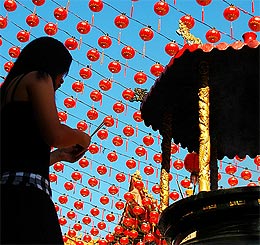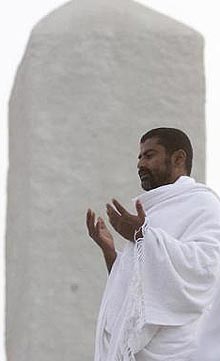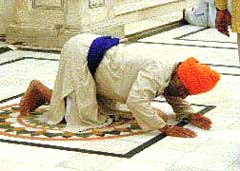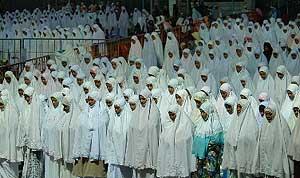Must religious dialogue be painful? Must it be greeted with hostility? Or is it a moot question - that the answer lies in our education system’s failure, decades ago?
 I have faith that we will one day be ready to appreciate interfaith dialogue. Same too for philosophical discussions and scientific debates. My experience conducting interfaith dialogues every semester in American classrooms gives me the assurance that we will be ready.
I have faith that we will one day be ready to appreciate interfaith dialogue. Same too for philosophical discussions and scientific debates. My experience conducting interfaith dialogues every semester in American classrooms gives me the assurance that we will be ready.
It would be good to know that eventually our corridors of academia are filled with passionate discussions on the self, the universe, God, and fate of humanity.
The core of each religious foundation is there for us to explore and to learn from. We need to escape from being trapped in the particular and liberate ourselves into explorers of the universal.
Of course this will take time given the nature of class and caste system we are in; developments that have impacted upon our consciousness. But evolve we must, if we are to see a progressive country emerging out of these ruins of communal politics, immorality of modern capitalism, and persistent religious misunderstandings. Ignorance is the greatest enemy of knowledge, as the sage Socrates once said.
What is interfaith dialogue?
 The aborted Bar Council forum was a good example how we will continue to approach inter-faith dialogue. There is vision in chaos, creation in destruction, and opportunities in threats. Educators of peace and social justice must not give up.
The aborted Bar Council forum was a good example how we will continue to approach inter-faith dialogue. There is vision in chaos, creation in destruction, and opportunities in threats. Educators of peace and social justice must not give up.
In a country with a Centre for Civilisational Dialogue in Universiti Malaya, and in a country wanting to be known as a "moderate country with a Muslim majority", we are seeing contradictions. It’ll get uglier if we fail to reflect upon the means and methods of religious dialogue.
We do not know much what each one of us believes in and what are the rituals and practices of our neighbours. We do not know what scripture they read, let alone the meaning of the prayers, the doa, zikir, the pujas, and the mantras. We lack the knowledge of the fundamentals. This is understandable - fear governs our consciousness and directs our actions and ultimately reproduces itself inter-generationally. Religion is a "sensitive" issue, they say - which needs desensitisation, I would contend.
Back to the Bar Council forum protests. It is a misrepresentation of what Muslims are and a reflection of how we have approached not only dialogue on religion but also on other "sensitive issues" as well. In this environment and in this regime where exploitation of issues are orchestrated by opportunists at the expense of peaceful dialogue, we will always be at the losing end of education for critical consciousness and for peace.
Humanism and rationalism
We must go back to the drawing board of our approach to teaching religion in terms of curricular design and how to juxtapose or even infuse it with core ideas of humanism and rationalism. This will take another few decades given the complexity of our society and its present evolution of “half-bakedness” of hypermodernity.
Here in the United States, I have just finished teaching two summer classes on 'Religions of the World' and 'Introduction to Religion' in a college where I have also been asked, for the last three years, to teach 'Islamic Scriptures'.
 I find it liberating to conduct classes after classes in which my students not only are American and foreign-born Muslims but also Jews, Christians, Catholic, Buddhists, Hindus, Atheists, Agnostics, and even Pagans. At the end of each semester, they have a different perception of each other - more in-depth understanding of what could have remained antagonistic. We read the Quran and the Hadiths and look at the scriptures from a hermeneutic perspective - situate it in the present and projecting it into the future.
I find it liberating to conduct classes after classes in which my students not only are American and foreign-born Muslims but also Jews, Christians, Catholic, Buddhists, Hindus, Atheists, Agnostics, and even Pagans. At the end of each semester, they have a different perception of each other - more in-depth understanding of what could have remained antagonistic. We read the Quran and the Hadiths and look at the scriptures from a hermeneutic perspective - situate it in the present and projecting it into the future.
Most often, our discussions on jihad evolved into a reflection on the struggles for the human self to explore suffering, violence, and liberation in all religious traditions. It includes passionate discussions on media representation of the concept.
I often wonder if what I am doing is possible in Malaysia but I certainly have the confidence and hope that given the most peaceful way to approach it, a lot can be gained. Essentially religious dialogue need not be painful.
It ought to help foster deep understanding and dispel misconception of ANY religion. It ought to make us become deeply religious and to learn to explore what others believe, to respect them, to learn from the universal themes of spirituality, and ultimately to contemplate our existence within the context of the struggle between Good and Evil and to evolve as more ethical and rational beings - so that we may participate better as political and social beings..
Major scriptures
 I believe we need to revamp undergraduate foundation courses in our public and private to include one that teaches the classics of the thoughts of the Eastern and Western tradition and the scriptures of the major religions.
I believe we need to revamp undergraduate foundation courses in our public and private to include one that teaches the classics of the thoughts of the Eastern and Western tradition and the scriptures of the major religions.
But then again, our university students are not even allowed to be involved in politics and to engage freely in public forum on political matters – how might this be possible with interfaith dialogue then?
We have a long walk to mental freedom and to a philosophical understanding of Islam and other religions. Unfortunately we are now known as people who are good at disrupting dialogues. I hope this perception will change.
But then again, education is about hope, peace, empathy, intelligence, and liberation - these we must use as a basis for a new design once we see major restructuring efforts under way undertaken by perhaps a new political, social, and educational arrangement.
Let us look at possibilities in interfaith dialogue. Let education for peace and justice do that.

